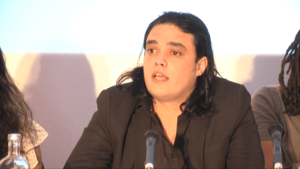Waleed Al-Husseini facts for kids
Quick facts for kids
Waleed Al-Husseini
|
|
|---|---|

Al-Husseini at the International Conference on Free Expression and Conscience 2017
|
|
| Born | June 25, 1989 Qalqilya, West Bank
|
| Nationality | Palestinian |
| Occupation | writer, essayist, author, activist |
| Known for | His arrest by the Palestinian Authority for allegedly blaspheming against Islam Writer, Secular Humanist, Founder of Council of Ex-Muslims of France |
Waleed Al-Husseini (born June 25, 1989) is a writer and activist from Palestine. He is known for being an atheist and a secularist, meaning he believes in separating government from religion. He also founded the Council of Ex-Muslims of France.
Waleed was born and grew up in Qalqilya in the West Bank. He moved to France in 2012. He became well-known after he was arrested in October 2010 by the Palestinian Authority. This happened because he wrote things online that were seen as insulting to Islam. His arrest got a lot of attention around the world. After being released, Waleed moved to France for safety. Since then, he has spoken out for secularism and against extreme religious ideas.
Contents
About Waleed Al-Husseini
Waleed Al-Husseini was born on June 25, 1989, in the city of Qalqilyah. He studied computer science at university. After finishing his studies, he helped out at his father's barber shop. People who knew him said he was a normal person who went to the mosque regularly.
Waleed spent a lot of time using the Internet. His mother found articles about atheism on his computer. She tried to stop him from reading these ideas by canceling their Internet. But Waleed then started going to a local Internet café. He would spend many hours there each day.
His Online Writings
Waleed Al-Husseini wrote on his personal blog and on Facebook. He used a pen name, which is a fake name. His writings often questioned religion and promoted atheism. He also wrote funny or critical pieces about religious topics.
On his blog, he wrote about why he left Islam. He explained that some people believe anyone who leaves Islam is a spy. He felt that people should be free to think and believe what they want. He also said that he believed all religions were "a bunch of mind-blowing legends." He criticized how Islam treated women and its rules. His online groups received many angry comments and even threats. His blog became very popular, getting over 70,000 visitors.
Arrest and Time in Prison
Waleed spent several months at the Internet café. The owner of the café, Ahmed Abu Asab, thought Waleed's activities were strange. He noticed Waleed was very secretive about what he was doing online. The owner used special software to see Waleed's screen. He found Waleed's writings that criticized religion. The owner and some friends knew about Waleed's actions. Someone might have told the authorities.
The Palestinian Authority (PA) intelligence watched Waleed for several weeks. On October 31, 2010, Waleed Al-Husseini was arrested at the café. News about his arrest spread quickly. The PA did not give a clear reason for his arrest. A human rights expert said that if Waleed were tried, it would be under an old law from 1960. This law makes it illegal to insult religion. A former chief Islamic judge said Waleed was the first person arrested in the West Bank for his religious views.
Reactions to His Arrest
Waleed Al-Husseini's family was very upset by his actions. His father said Waleed was "bewitched" by a woman he met online. Some of his cousins said his mother wanted him to be in prison for a long time. This was to protect him from people who might harm him and to restore the family's honor.
In his hometown, many people criticized his actions. Some even said he should be punished severely. However, human rights groups like Human Rights Watch called for his release. They said that holding him without charge for a long time was against Palestinian law. They believed he should be protected for his right to speak freely. The French government also showed concern about his arrest.
Newspapers like The Wall Street Journal and Los Angeles Times wrote about Waleed's case. They discussed how important freedom of speech is. They also wondered if the Palestinian areas would become more open or more strict about religion.
In December 2010, a letter appeared on Waleed's blog. It seemed to be an apology for offending Muslims. However, Waleed later said in his book that he did not write this letter. He found it on his blog after he was released. A Palestinian security source said Waleed was kept in jail for his own safety. They were afraid his family or others might hurt him. After ten months, Waleed was released on bail. But he was sometimes arrested again and held for a few days. During one of these times, he faced harsh treatment. His computers were also broken, and he was told to stop posting his views online.
Moving to France
After being released from prison, Waleed Al-Husseini said he was often bothered by PA security forces. He also received many threats to his life. He was scared for his safety. He said goodbye to his family, who he felt did not fully understand his atheism but still supported him as their son.
He learned that France had helped him while he was in prison. So, he decided to seek safety there. He traveled from the West Bank to Jordan. From there, he got a visa from the French embassy and moved to Paris. He asked for asylum, which means protection from his home country. In his book, Waleed later found out he was sentenced to seven and a half years in prison in his absence.
Life in France
Starting the Council of Ex-Muslims of France
On July 6, 2013, Waleed Al-Husseini and about 30 other former Muslims started a group called the Council of Ex-Muslims of France (CEMF). This group is made up of atheists, free thinkers, and humanists. They work to promote reason, human rights, and secularism.
The Council believes in the freedom to criticize religions. They also oppose any religious practices that go against people's rights or freedoms. They especially support the freedom and equality of women. Waleed Al-Husseini has spoken about the CEMF on French radio.
Speaking for Secularism
In early 2015, Waleed Al-Husseini published his autobiography. This was around the time of some terrorist attacks in Paris. He appeared on many French TV and radio shows. He also wrote an article for a newspaper about the need to discuss and reform Islam.
His book, titled Blasphémateur ! : les prisons d'Allah (which means "Blasphemer! The Prisons of Allah"), talks about his journey. He explains how he came to question Islam by studying its history and texts. He also shares his experiences with blogging, his arrest, and his move to France. In his public appearances and book, he strongly supports French principles of secularism. He believes there should be more open discussion about parts of religious texts, especially after the attacks in Paris.
In 2016, Waleed Al-Husseini went to Denmark for a debate about "Islam and Atheism." He and other former Muslims talked about what happens when people leave Islam. The event needed strong police protection because of threats from some religious people. Waleed said that when he came to France, he expected to live a normal life as an atheist. But he found that he and other ex-Muslims were still bothered by some Muslims, even in Europe.
As a refugee in France, Waleed Al-Husseini has continued to speak publicly. He supports secularism, freedom of thought, and freedom of speech. He believes people should have the right to criticize religion. In 2017, he wrote another book. In this book, he argued that some politicians and thinkers in France had not upheld the ideals of the secular French Republic. He accused them of helping radical Islam, sometimes to get votes or because of their own beliefs.
See also
 In Spanish: Waleed Al-Husseini para niños
In Spanish: Waleed Al-Husseini para niños
- Freedom of religion in the Palestinian territories
- Human rights in the State of Palestine


